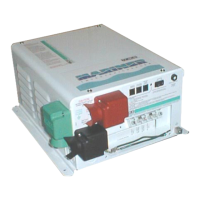)($785(6
&RS\ULJKW7UDFH(QJLQHHULQJ&R,QF 7HOHSKRQH 3DUW1XPEHU
WK
6WUHHW1( )D[ 2FWREHU
$UOLQJWRQ:$86$ ZZZWUDFHHQJLQHHULQJFRP
3DJH
cold. When the light gets hot it becomes a 30-watt load. Since this is below threshold of 40-watts, the
inverter will not detect it and the light will go out. This will cause the light to cycle repeatedly.
Example B: If the threshold is set to detect a 30-watt load and a 40-watt fluorescent light is turned
on, the inverter will not detect the light. The light presents a smaller load than 30 watts until the gas in
the fluorescent tube ionizes.
Example C: There are some appliances that draw power even though they are turned off. TVs with
instant on circuitry microwave ovens with digital displays and VCRs are examples. These loads
present a dilemma. If the sensitivity is set higher than the combination of these loads, then an
auxiliary load must be used to bring the inverter out of the search mode before the appliances can be
turned on. If the sensitivity is set lower than this combination of loads, the loads will be left on and will
put an additional drain on the batteries. Three such 15-watt loads would amount to an additional 90
amp/hours per 24 hours in a 12 VDC system.
One solution is to turn these items off at the wall. Use an extension cord with a rocker switch, a
switch at the outlet, or the appropriate circuit breaker. Another solution might be to place all these
phantom loads on a separate circuit with its own disconnect.
This circuit determines how much power the inverter draws when there are no loads. The inverter’s
transition from the no load state to full output voltage is fast, eliminating delays when operating
devices such as hand tools. Additionally, the threshold sensitivity of the search mode is user
adjustable (with the optional RC7 remote control), and it may be disabled.
,PSXOVH3KDVH&R UUHFWLRQ
This circuitry improves the shape of the output waveform while the inverter is running reactive loads.
It allows the inverter to closely duplicate the characteristics of standard public power. With this
design approach, the limitations of the modified sine wave format are largely overcome. The primary
benefit is realized when the inverter is running induction motors and fluorescent lights. Induction
motors are commonly used to run drill presses, fans, and bandsaws.
When an inductive load is driven, it tries to return a large portion of the energy that it has received.
This returned energy can be thought of as going ‘backwards’ through the household wiring to the
motor, giving the motor an extra push and making it run smoothly. Impulse phase correction
provides a similar path for this ‘backwards’ energy. The Mariner line of inverter/chargers will run
small motors at full speed, start larger ones, and run both efficiently.
7 UXH5069 ROWDJH5 HJXODWLRQ
With battery voltages from 11 to 15 VDC and power levels up to the continuous power rating, the
inverter will deliver true RMS regulated power. This insures that while battery voltages and power
levels change, the inverter will deliver the correct output voltage.

